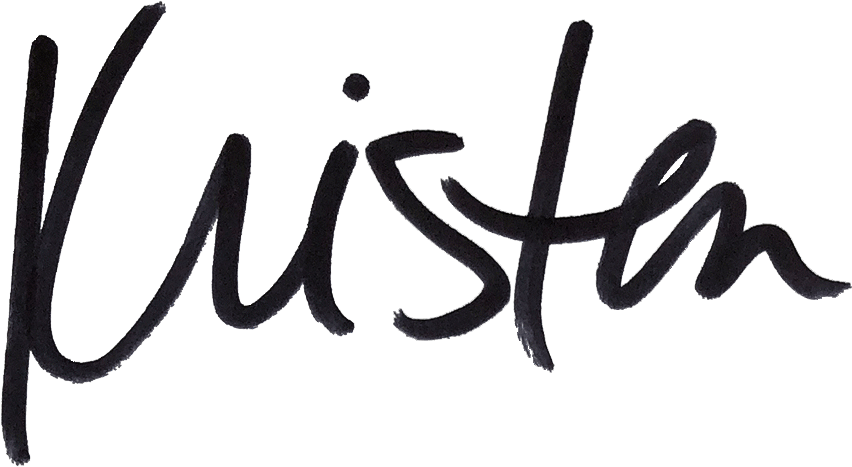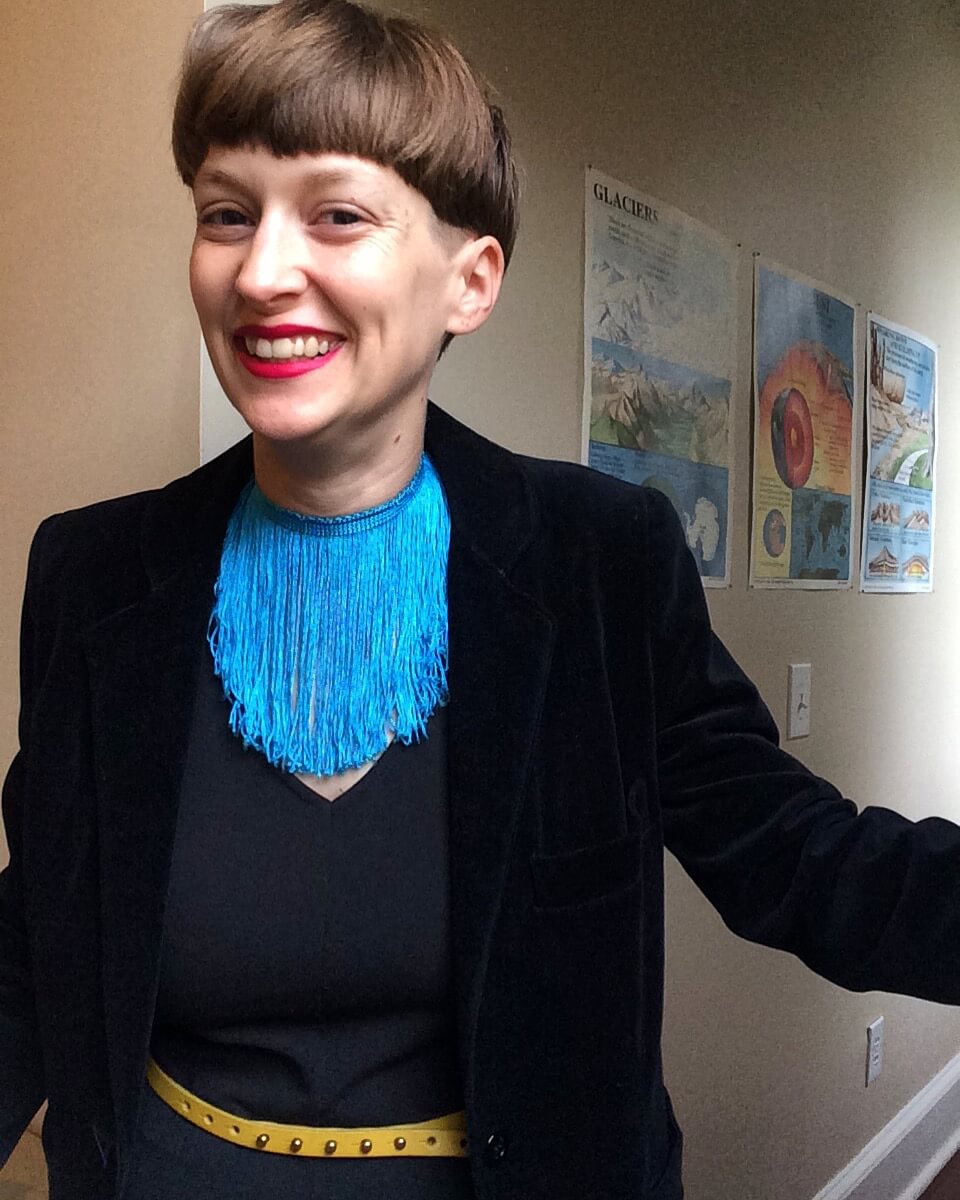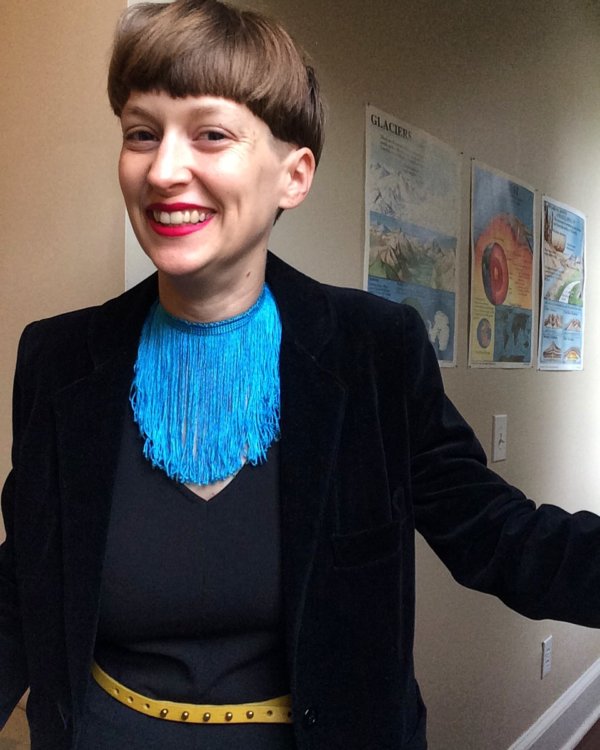This is an episode of my podcast, That’s What She Said! Listen in below or read along for a transcript.
For all those in the back who are hiding in caves filled with guilt and regret and silence, I repeat: your shame is not interesting. For the females meant to feel awful about everyday things like menstruation or using your voice or eating carbs or enjoying you-name-it, I repeat: your shame is not interesting.
Unless you have recently taken up cannibalism or finished up a stint as a serial killer, your shame is not particularly justified or interesting. Of course, It will seem justified and interesting.
Asshole brain needs you to believe that speaking your shame will kill you.
Just thinking about it will cause your cheeks to redden, your heartbeat to quicken, and your hands to shake as if you’re going straight into physical combat against a juggernaut.
Brene Brown tells us, “Shame needs three things to grow exponentially in our lives: secrecy, silence, and judgement.” Since I’m committed to both growing and to sharing what I learn from growing, I can absolutely confirm that she’s right. Shame makes me want to throw myself into a tiny room and never come out, all while telling myself that I should just GET MY SHIT TOGETHER ALREADY.
I’ve most commonly encountered three responses to sharing my shame. Spoiler alert: not a single one is awful.
Response #1: thank you.
When you talk about your deepest, darkest secrets, you are often speaking your particulars to a larger universal. The response is not the much-feared YOU ARE A HORRIBLE PERSON AND NOW I HATE YOU, but a sigh of relief that comes with the feeling that you have allowed yourself to be seen and shared your humanity.
Response #2: me, too.
People have quietly admitted their depression, their failures, their illnesses, their stuck points, their abandoned projects, and their sex issues to me behind closed email doors with a ‘me, too.’ They aren’t asking me to fix or solve or change anything about these things, but in some way they feel witnessed. There’s comfort in ‘me, too,’ even when the thing you’re referencing is awful or painful or difficult or unfixable.
Response #3: I’m so glad I’m not alone.
One of the ways asshole brain beats us into submission and keeps us as small as possible is by whispering that we, in all of creation, are alone in our predicaments. It tells us we are the only ones who have had bad relationships, lost lots of money, given up on sex, abandoned self care, chosen the wrong mentor, battled mental illness, freaked out about the state of the world, or quietly retreated into a hole while hoping the world would go away.
You. Are. Not. Alone.
Sharing your shame means that other people get to experience the life-giving sensation of feeling not-alone. Solidarity is a glorious thing.
Where you find shame, you find the opportunity to speak THROUGH it.
Sure, you can buckle down and fill yourself with even more doubt and yuck, or you can express your shame with a trusted individual. (I choose to speak to the internet at large; you are NOT required to do so!)
When I find things in my life I’m ashamed of, I’ve simultaneously found places in my life that are ripe for growth.
Feeling ashamed of your house/car/kids/family/partner/abortion/sex life/business/project/job?
Speaking through shame will always lead to growth.
It frees you to address the elephant in the room of your heart instead of drawing tighter and tighter to the walls while hoping it magically goes away or feels better.
If you’re like, ‘PISHAW KRISTEN, WHEN HAVE YOU SPOKEN THROUGH SHAME?’ So many times.
I was very sure everyone would abandon me and I would die when I spoke about:
Depression. I was deeply ashamed of having been on antidepressants and of not being as joyful as I appeared to be online for every minute of the day. Speaking about my depression over the years has required increasing levels of vulnerability, of introspection, and of facing my demons. It has also resulted in emails in which people credit me for literally saving their lives.
Divorce. I viewed divorce as such a big personal failure that I didn’t mention it to my clients or my peeps for over a year after my husband had moved out. If I couldn’t make a relationship work, how could clients trust me? If I couldn’t remain committed after I’d made VOWS to be committed, what did my word even mean?
Losing $43k. Holding a big event that didn’t make my accountant happy with the year’s numbers basically destroyed me, so I waited for two years before saying a word. I considered giving up the entire being-in-business thing to go and work at Starbucks, but decided instead to tell everyone about it.
Those who attended the big event sent love letters. Others thanked me for telling the not-so-glorious tale of business as it happened. Again, all those asshole brain thoughts proved to be unnecessary: how can you give advice when you’re such a big failure? How can you possibly show your face in public again? How can anyone respect you for losing forty-three grand and a husband in the same year?
Breathwork and coming out of the spiritual closet. I’ve long been afraid of being disregarded as a bunch of worthless cotton candy hoohoo fluff, so I shut up about my spiritual beliefs for a good solid eight years of being in business. (That’s powerful shame, people.)
The truth is, breathwork is a useful and powerful part of my life. Doing it regularly is not nearly as hard as talking about it — in particular, trying to put words to its effects — but I keep trying. Shame said I’d come off as cocky (what, you’re a spiritual leader now?), flighty (who is both a business coach AND a breathwork practitioner?), and useless (yah, like what the world needs now is BREATHING. We have bigger fish to fry).
Peeps have responded with loving kindness to breathwork in all its forms, whether online or in person, and I continue to grow and shape my practice to handle deeper truths and bigger growth.
Sex and enjoying it. It seems strange to me that I hid this for so long, but then again I grew up in a rural Christian community and almost signed a True Love Waits pledge at age 14. Shame whispered that I’d gone too far by talking about orgasms, that no one could possibly relate to my desires, and that, as always, everyone would abandon me and I’d have to get a job at Starbucks. (See the asshole brain pattern? We all have one.)
Cannabis and enjoying it. What’s more horrifying than talking about sex, you ask? WEED. The now-standard asshole brain refrain kicked up, but I powered through and got entirely complimentary responses. Those who were also afraid of trying cannabis thanked me for weighing in, those who dig cannabis liked me more, and a few IRL friends said they appreciated the podcast for its humor and structure. (Read: no one came and burned my house down.)
Had shame stopped me from sharing, it would also have stopped my growth as a human, healer, and writer.
I would never have felt the deluge of love that can come after a particularly vulnerable share, nor would I have noticed the patterns asshole brain employs over and over again. (Related: all roads lead to loveless and penniless.)
Let’s suss out the shame in your life now.
You don’t have to share these answers with the world at large! Admitting these soft spots to yourself is often representative of tremendous progress. Going on to share your shame with a therapist, healing practitioner, partner, friend, loved one, or coach might do you a world of good, but is in no way required.
Which business experiences or circumstances do you hope no one ever finds out about?
I’ve had coaching clients mutter that they have no clients (shame), that they have too many clients and are dropping the ball (shame), that they fear they love their work too much (shame), and that they no longer love their work (shame). There is no universal answer, here. There’s only the thing you hide and hope no one ever finds.
What do you deeply enjoy, but feel as if you don’t deserve? What do you deeply enjoy, but fear would make other people jealous if they found out?
My peeps have told me about how easy it is to create, to write, to photograph, to make people feel at ease, to hear other people’s secrets, or to speak in front of people — each time with great shame. It’s so easy for me, I don’t want to tell anyone else! It seems to be such a struggle for other people! Your talents aren’t something to be ashamed of. EVER. What do you tamp down, play down, or ignore because you don’t want other people to envy you?
What do you truly and madly love, but don’t share because you’re afraid someone else will judge it harshly?
Go ahead and love horses or fan fiction or houseplants or dogs or kink or coding or sewing or that particular cause! We need people who LOVE what they love and aren’t afraid to show it. (Related: joy is an act of resistance.)
Being ashamed of your joy doesn’t have any positive benefits and can keep you miserable for as long as you let it. Also, it doesn’t count if you don’t enjoy it. What do you just plain freaking no apologies love, and can you pick that interest up and let it out to play again?
What do you judge harshly about your own life or business circumstances? What are you ashamed that you haven’t ‘figured out’ by now?
This applies to everything from your curtain choices to your financial circumstances. Where you find judgement, you’ll often find shame — and as we know, your shame is not interesting. I feel like, by age 38, I should have figured out taxes, investing, and budgeting enough to be at least a millionaire, if not a billionaire, by now. I also feel like I should have figured out how to enjoy the act of cooking and how to work out daily in a no-big-deal way instead of in a LOOK AT ME I NEED A STICKER way.
It’s okay if you need stickers to get shit done. It’s perfectly normal to be good at some things and suck at others, even if society wants to sell us an answer for every one of our perceived flaws.
Which stories about your life do you refuse to tell anyone?
This doesn’t have to be a big or traumatic story (see: sex, cannabis, breathwork). It only has to be an experience you’ve taken off the table.
Some childhood experience that made a mark. A professional encounter that shaped the rest of your career. One offhand comment that closed a door. You don’t have to hide these from yourself any longer.
Which life experiences do you refuse to share, even though they ‘aren’t that big a deal’ or ‘you should be over them by now?’
I’m still upset about the woman ‘I should be over by now’ who called me “hopelessly naive” for going off to work with Flying Kites, a nonprofit in Kenya. (That was 7 years ago.) You don’t have to be over it by now — whatever it is — but keeping it all buttoned up and pretending you’re fine doesn’t allow for any progress to be made.
Next: what does your asshole brain say will happen if you speak about the answers you just gave with anyone at all?
Common options: death. Destruction. Homelessness. Loss of life, relationships, clients, business, respect, or all five. You’ll be living in a van down by the river in no time. Your partner will leave you. You’ll be forced to survive on only expired Pop Tarts and puddle water. Your parents will disown you. Your colleagues will oust you from their company.
Write down the answer by going allllllll the way into whatever asshole brain has to say, knowing that this is a standard human lizard-brain response.
Finally: what do you suspect will actually happen if you speak about the answers you gave with a trusted individual?
Common options: NO REALLY YOU’LL DIE. (Kidding!)
You’ll feel uncomfortable. You’ll sweat through your shirt. You’ll feel so vulnerable you can hardly breathe. You’ll upset someone. You’ll hear “Thank you,” “Me, too,” and “I’m so glad I’m not alone” far more than usual.
Write down the answer and go all the way into what your highest/best self knows to be true about the situation, knowing that you’ll survive it.
As Brene Brown says, “Shame cannot survive being spoken.”
I dare you to speak through your shame. I dare you to be honest with your own heart, and then to tell on yourself, to be wildly vulnerable, and to see what happens next. (Hint: it’s gonna be RAD.)










